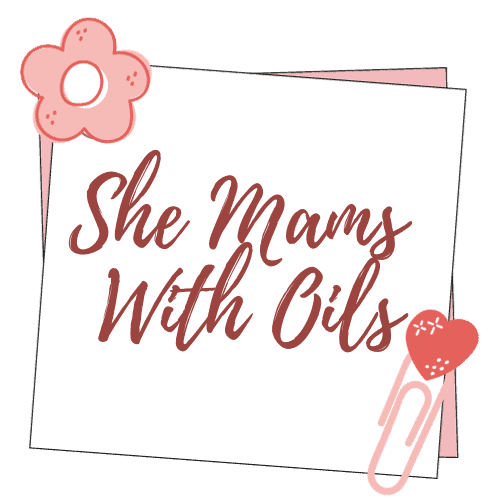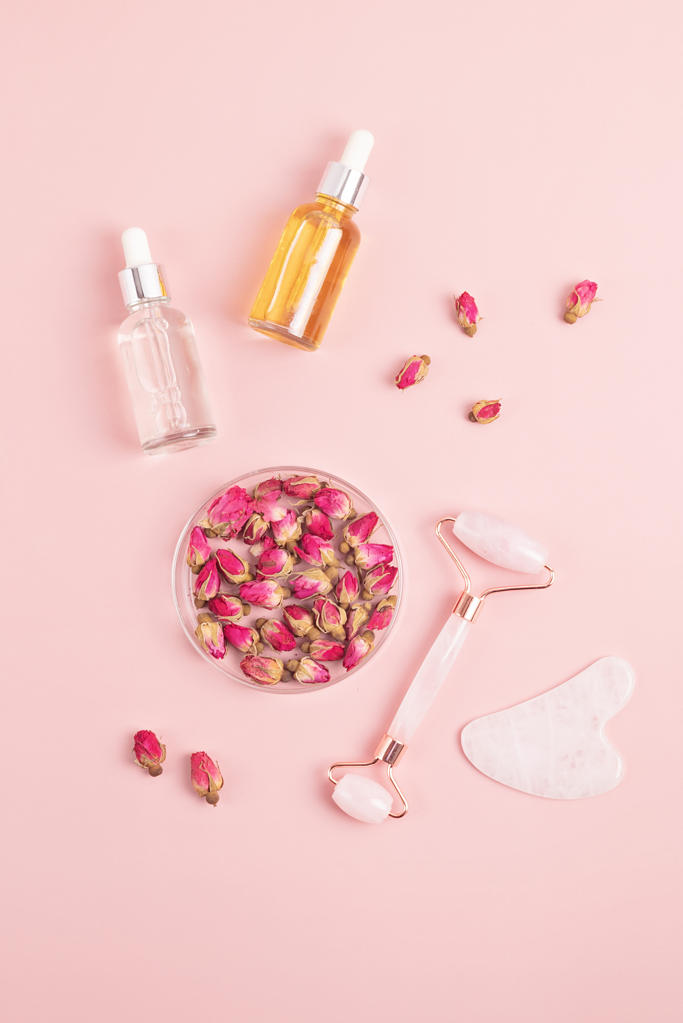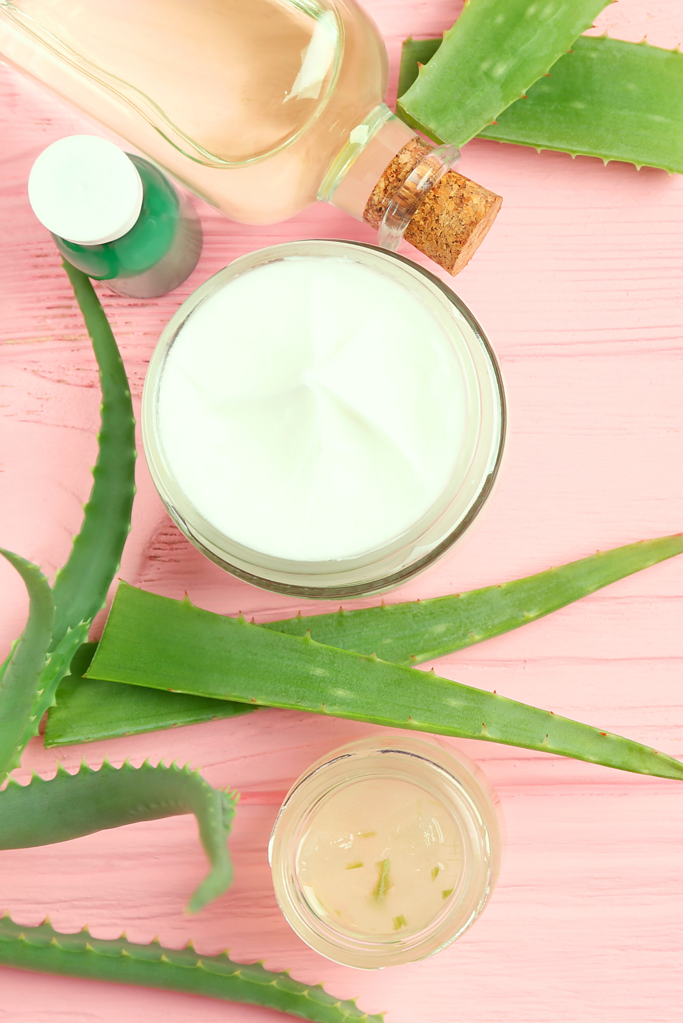DOES ALOE VERA HELP WITH ACNE SCARS AND HOW TO USE IT
Does aloe vera help with acne scars and how to use it.
Are you tired of battling acne scars and searching for that perfect remedy? Look no further because aloe vera might just be your new best friend!
Known for its soothing properties, aloe vera has gained quite a reputation in the skincare world. And for a good reason! It’s packed with powerful healing properties that can potentially fade those scars away.
But how exactly do you use it? Don’t worry, I’ve got you covered.
In this blog post, we’ll dive into the science behind aloe vera’s potential to heal acne scars and I’ll give you a step-by-step guide on how to incorporate it into your skincare routine.
Get ready to say hello to aloe vera and wave goodbye to those acne scars!
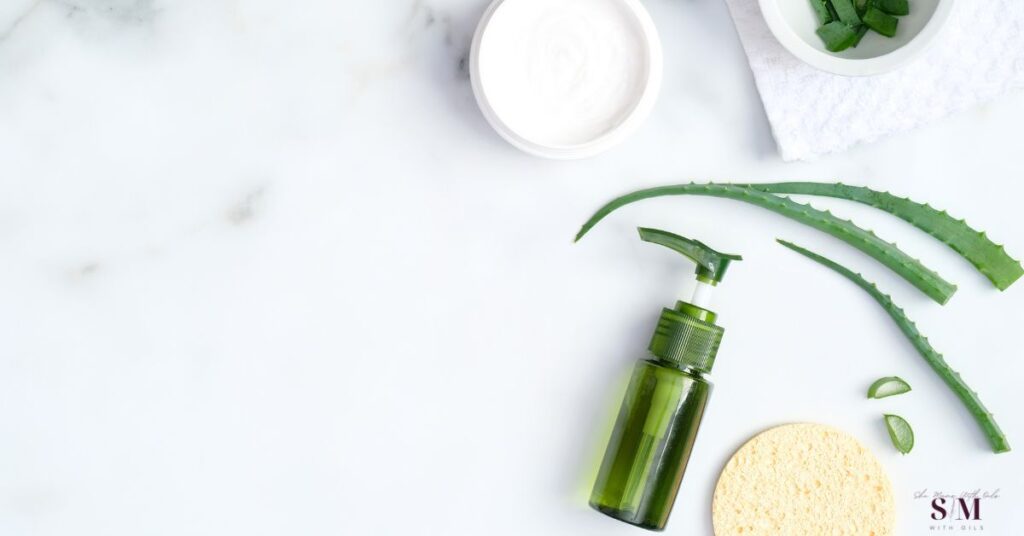
The following post may contain affiliate links, which means I’ll get a small commission if you decide to buy using the links provided. This will add NO EXTRA COST to you but it helps me to keep this blog up and running. Thank you. You can get more info by reading my Disclaimer page.
Hello dear friend, I hope you are having a great day.
If you had a look around my blog, you will have noticed that in there last couple of weeks I’m focusing my attention in writing articles about how to treat and prevent acne breakouts using only natural ingredients and DIY beauty products.
Today I’m concentrating on the use of Aloe Vera gel to help reduce the appearance of acne scars.
In this article I’ll explain
- What Aloe vera gel is,
- How it is harvested,
- What are its benefits,
- Its side effects,
- What type of aloe vera to use,
- How to use it effectively to reduce scars and acne lesions,
- FAQs.
I hope you will find this post useful!
IMPORTANT
The content of this blog post is intended for information purposes only. It is not intended to replace professional medical advice.
I am not a doctor and I’m only sharing my personal experience here.
If you are unwell or sick, always ask your trusted doctor or medical practitioner for advice. Pay particular attention if you are allergic or intolerant to any food and/or medication, if you are pregnant or breast-feeding. Children and elderly people should also seek medical attention quickly if unwell or experiencing any symptom.
Even if you don’t experience any symptom, always contact your trusted health provider if in doubt. If you feel unwell and are worried, it is safer to ask for medical advice from a professional than to wait.
Always keep essential oils out of reach of children.
Never risk it!
IMPORTANT
Always read the label carefully before consuming any medication. Never exceed the recommended dose. Ask for the advice of your pharmacist if in doubt, and if you are already taking other prescriptions, if you are allergic to any ingredient, if you are pregnant or breastfeeding.
Moreover, contact your doctor immediately if your symptoms don’t improve or if you get worse.
DIY ALL NATURAL SKIN CARE AND BEAUTY RECIPES
If you are looking for inspiration for some DIY beauty products with natural ingredients, make sure to check the following posts:
what are different types of acne scars?
According to this article:
”The following types of scars occur in acne:
- Ice-pick scars – these are deep, narrow, pitted scars
- Rolling scars – broad depressions with a sloping edge
- Boxcar scars – broad depressions with sharply defined edges
- Atrophic scars – flat, thin scars or depressed scars (anetoderma)
- Hypertrophic or keloid scars – thick lumpy scars.”.
Do acne scars go away?
There are different types of acne scars, depending on their appearance and severity. Some mild scars might eventually fade away. On the contrary, more severe or deep scars may not go away completely on their own. In those cases, you will need to ask a professional to treat them.
Thankfully, for very severe cases, there are a number of treatments available, such as:
- Topical creams and gels;
- Chemical peels;
- Microdermabrasion;
- Dermabrasion;
- Laser treatments;
- Microneedling;
- Dermal fillers.
Always consult with a dermatologist or a skincare professional who can assess your specific situation and recommend the most suitable acne scar treatment for you!
Also, keep in mind that results may vary depending on the type and severity of the scars, as well as individual factors.
How do you get rid of acne scars naturally?
Although natural, home remedies are NEVER meant to replace medical advice and treatment, there are some natural solutions you could start using from the comfort of your home to treat acne scars.
Aloe vera gel is definitively one natural ingredient I always have on hand in my home. For example, I find it very useful to rub it on my skin after being exposed to the sun in summer, and to mix it with essential oils for a soothing DIY night cream.
what is aloe vera?
The Aloe vera plant is very popular, due to its versatility and potential benefits. A succulent plant that belongs to the Aloe genus, Aloe Vera has thick, fleshy leaves that contain a clear gel-like substance, which is commonly used in various health, beauty, and skincare products.
Originally native to the Arabian Peninsula, it is now cultivated worldwide.
What is aloe vera most commonly used for? WHAT ARE THE BENEFITS OF ALOE VERA?
Aloe vera is widely known for its medicinal, beauty, therapeutic and antioxidants properties. Its gel is rich in nutrients, including vitamins, minerals and amino acids.
It is known for its soothing and cooling effects on the skin and is often used to treat sunburns, minor cuts, and skin irritations. Many people also use aloe vera gel as a moisturizer to hydrate and nourish the skin.
Furthermore, aloe vera is also used in shampoos and other hair care products.
Apart from personal care uses, aloe vera is also used in the form of juice or supplements for its potential health benefits. It is believed to have anti-inflammatory properties and can aid in digestion, support the immune system, and promote overall wellness.
However, it’s important to note that while aloe vera has been traditionally used for all of those purposes, scientific research is still needed to effectively prove its effectiveness to treat skin and health conditions.
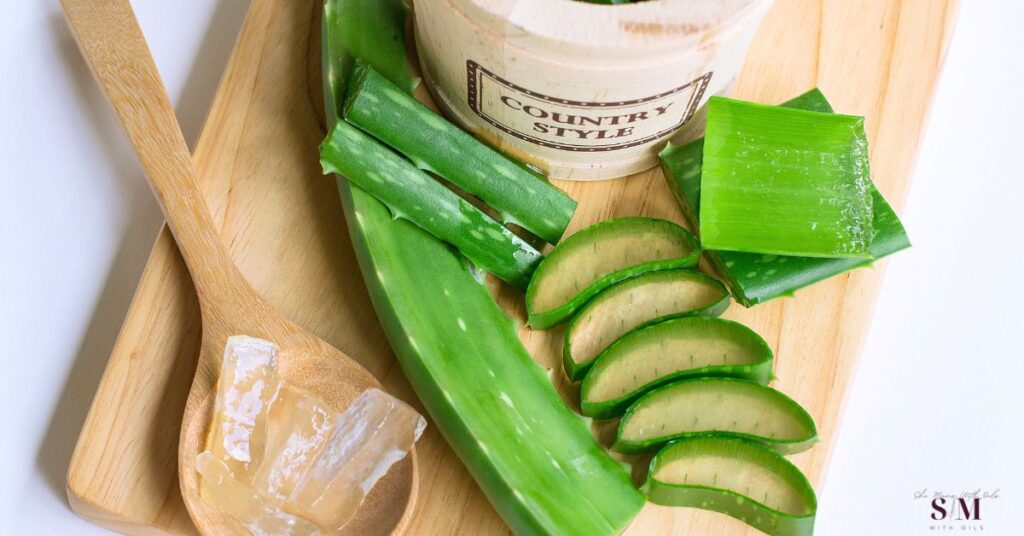
DOES ALOE VERA HELP WITH ACNE SCARS?
If you suffer from acne, naturally you will want to know if you can use aloe vera gel effectively on your face to limit new breakouts and to reduce the appearance of scars.
Although more research is needed, many people have reported great success using aloe vera. I use it daily myself, and I’ve talked about it several times on my blog.
For example, you could make my DIY night cream for acne-prone skin.
Can aloe vera clear scars?
According to this article from Healtline.com:
“There are a few ways aloe vera applied to the skin may help to reduce acne scar formation.
Examples include:
- Boosting immune response. A 2009 article published in the International Journal of Natural Therapy reports that aloe vera may increase the immune system’s response to inflammation, and this in turn may reduce the appearance of acne scarring.
- Increasing collagen and elastin fiber production. These fibers are responsible for repairing scarred areas. Applying aloe vera may help to especially stimulate collagen compound production, according to the Iranian Journal of Medical SciencesTrusted Source
. Increased production of these fibers may also help to reduce the signs of aging. - Reducing inflammation. Applying aloe vera may help reduce inflammation that can lead to acne scarring, according to an article in the Pharmacognosy Review.
Many studies surrounding aloe vera gel and scarring is related to burns and surgical scarring. However, the benefits have the potential to extend to acne scarring as well.”.
what is the best Type of aloe vera to use for acne scars?
Aloe vera gel is a very common preparation. Indeed, you can easily find it at your local supermarket, health store or online.
However, not all types of products are created equal. Consequently, not every product that contains aloe vera gel is suitable for your face, and to treat acne scars.
When buying aloe vera products, always look for:
- 100% pure, organic and unadulterated gel;
- Fragrance free;
- Suitable for face and body.
Can you use aloe vera straight from the plant?
Yes, you can use aloe vera straight from the plant by extracting the gel from its leaves.
To use the gel directly from the aloe plant, follow these simple steps:
- Select a mature aloe leaf: choose a leaf that is healthy, plump, and at least 4-6 inches long.
- Cut the leaf: using a sharp knife, cut the leaf as close to the base of the plant as possible.
- Drain the yellow sap: after cutting the leaf, you may notice a yellowish sap seeping from it. This sap, known as Aloin, can cause skin irritation for some people. To remove it, place the cut leaf upright in a bowl or container for a few minutes until the yellow sap drains out completely.
- Remove the outer skin: once the yellow sap has drained, lay the leaf flat on a cutting board and carefully slice off the thorny edges on both sides. Then, make a lengthwise incision along the leaf to expose the inner gel.
- Scoop out the gel: use a spoon or a butter knife to scoop out the clear gel from the leaf. Be gentle to avoid getting any of the yellow sap from the outer leaf into the gel.
- Collect the fresh aloe vera gel in a container: collect the gel in a clean container or directly apply it to your skin.
Remember that the gel extracted straight from the plant will spoil quickly.
Therefore, you should use it immediately. Alternatively, you should store it in the fridge, in a clean glass container, for up to 2 days.
How to use aloe vera to treat acne scars
Using Aloe vera gel to treat acne scars is very easy indeed!
Just follow these simple skin care routine steps:
- Firstly, make sure to wash your face with a mild and gentle detergent, in order to get rid of impurities, dust, make up, etc.
- Follow up with your usual toner, to completely cleanse your face and to tone skin pores.
- Apply aloe vera gel to the affected area. You might just do a spot treatment, or you might want to apply the gel all over your face.
- Apply your usual skin serum;
- Lastly, finish up with your usual daily moisturiser or night cream.
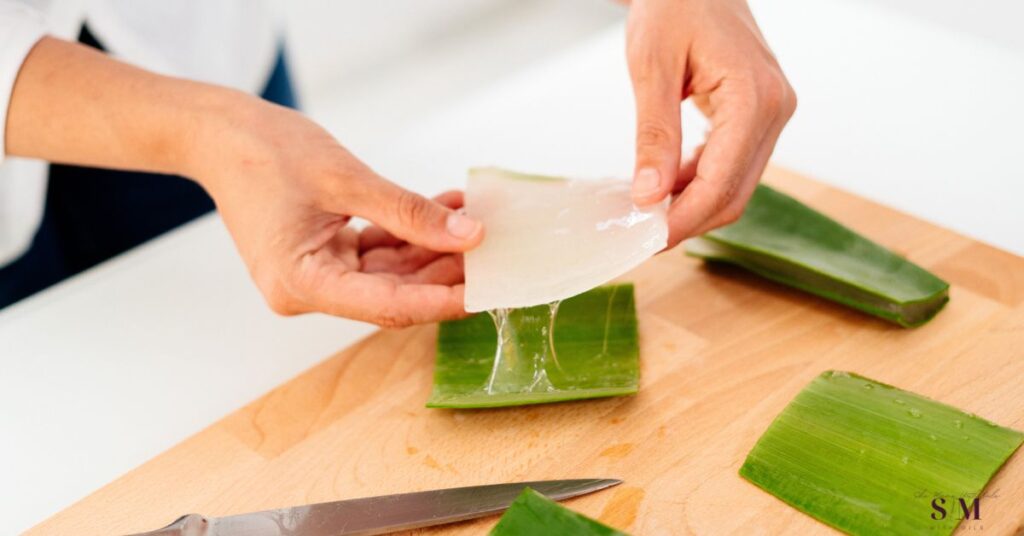
DOES ALOE VERA HELP WITH ACNE SCARS: FAQS
Here are some common questions about how to use use aloe vera to treat acne and acne scars.
Is aloe vera moisturizing or drying?
Generally speaking, aloe vera is considered as moisturising for the skin.
In fact, the gel contains a high level of water, which of course helps to hydrate the skin, when you apply it topically.
Aloe vera gel locks in moisture and can also create a protective barrier on the skin, preventing moisture loss.
It is important to remember that people will react differently to different natural ingredients!
While aloe gel is certainly moisturising, people with very dry skin and/or sensitive skin might find it too harsh on their face.
That’s why you should always ask for the help of a professional, board-certified dermatologist before applying any product on your face and body.
Furthermore, to avoid adverse reactions and allergies, always do a patch test on a small area before using a new product!
Does aloe vera clog pores?
Aloe vera gel is generally considered non-comedogenic, meaning it has a low likelihood of clogging pores. This makes it suitable for most skin types, including acne-prone or oily skin.
This natural gel has a lightweight consistency and is easily absorbed into the skin without leaving a heavy or greasy residue.
However, it’s essential to ensure that the aloe vera gel you use is 100% pure and does not contain additional ingredients or additives that may potentially clog pores.
How long should I leave aloe vera on my face? Can I leave aloe vera on my face all day or overnight?
Aloe vera gel is very gentle to the skin and therefore you can leave it to work for many hours and overnight. That is, of course, if it suits your skin and you don’t experience any adverse reactions.
Indeed, leaving aloe vera gel on your face overnight can provide additional time for its moisturising and soothing properties to work. It allows the gel to be absorbed into the skin and deliver its beneficial nutrients, promoting hydration and potentially aiding in the healing process of acne scars or other skin issues.
Important!
If you’re concerned about your acne scars, you should consult with a dermatologist or a skincare professional who can provide you with personalised advice and recommend additional treatments or interventions, if necessary.
How long does it take for acne scars to fade with aloe vera?
Just like with any natural ingredient and natural remedy, it takes time, commitment, regular use and patience to see true results.
Noticeable improvements can take weeks and even months, and it is important that in that time you stay consistent and apply aloe vera gel every day, at least once.
The time it will take depends on several factors, such as the type, age and severity of the scars, your individual skin type, etc.
In addition to that, unfortunately, some scars might never disappear, and aloe vera gel might only help in reducing their appearance slightly.
Did you Know?
WHAT IS THE TYPICAL SKIN CELL TURNOVER RATE?
The typical skin cell turnover rate, also known as the skin renewal cycle, can vary depending on various factors such as age, overall health, and individual characteristics. On average, the skin cell turnover process takes about 28 to 40 days.
In this cycle, new skin cells are continuously generated in the deeper layers of the epidermis (the outermost layer of the skin) and gradually move upward to replace the older, dead skin cells that are shed from the surface.
However, it’s important to note that the skin cell turnover rate can be influenced by several factors. For example:
- Age;
- Genetics;
- Lifestyle;
- Sun exposure;
- Hormonal changes;
- Certain skin conditions;
- Etc.
What are the risks and side effects of aloe vera on the skin?
Although pure aloe vera gel is considered generally safe for topical use, like any skin care product, some people might experience some side effects.
For example:
- Allergic reactions: although very rare, some people might be allergic to aloe vera. That’s why you should always do a patch test first! If you experience any signs of an allergic reaction, such as itching, redness, rash, or swelling, discontinue use and seek medical advice.
- Skin irritation: if you have sensitive skin, or any skin condition, you should consult with your dermatologist before using aloe vera gel. Topical use can indeed cause skin irritation. That is particularly true if you are not using 100% pure and unadulterated aloe gel.
- Dryness or tightness: some people might experience a sensation of tight and dry skin after applying aloe vera gel. Although this sensation is only temporary, ask for a professional advice if it persists.
- Interaction with medications: if you are using any medication at all, it’s important to consult with your healthcare provider or pharmacist before incorporating aloe vera gel into your skincare routine. Indeed, this natural gel may interact with certain medications, potentially reducing their effectiveness or causing adverse effects.
- Sun sensitivity: Aloe vera gel does not provide sun protection. If you are using aloe vera gel during the day or going outdoors, you must apply a good sunscreen to protect your skin from harmful UV rays.
Who should not use aloe vera? When should I avoid aloe vera?
While aloe vera is generally safe for most people, there are some precautions you should follow around its use.
Avoid it if you:
- Have a known sensitivity or allergy to it;
- Have open wounds or sever burns;
- Are pregnant or breastfeeding;
- Are taking any medication that could interact with it;
- Have received surgery recently and still have fresh surgical incisions;
- Have very sensitive skin. Particularly in children and the elderly!
DOES ALOE VERA HELP WITH ACNE SCARS AND HOW TO USE IT: CONCLUSIONS
Dear friend, if you are wondering “does aloe vera help with acne scars and how to use it”, I hope you found this article helpful.
Aloe vera is a natural remedy that can help provide an effective acne treatment, and reduce the appearance of acne scars. Its healing properties, including anti-inflammatory, antibacterial properties and collagen-stimulating effects, make it a valuable addition to any skincare routine. By following the step-by-step guide provided in this blog post, you can harness the benefits of aloe vera for a healthy skin, and potentially improve the appearance of your acne scars. Give it a try and make sure to leave a comment below if you do. I’d love to hear from you!
Till next time, Dee.
Hi, I’m Dee!
Mom of three; printables creator, natural solutions, simple living and homemade food enthusiast; “Outlander” fanatic.
When I’m not busy writing and designing, you can always find me covered in a cloud of flour in the kitchen, playing and crafting with my children, or making up some blends with my Essential Oils. Also I’m practically obsessed with Crystals and reading during my spare time.
Come along on our crazy journey as a family living in the countryside of Ireland!

